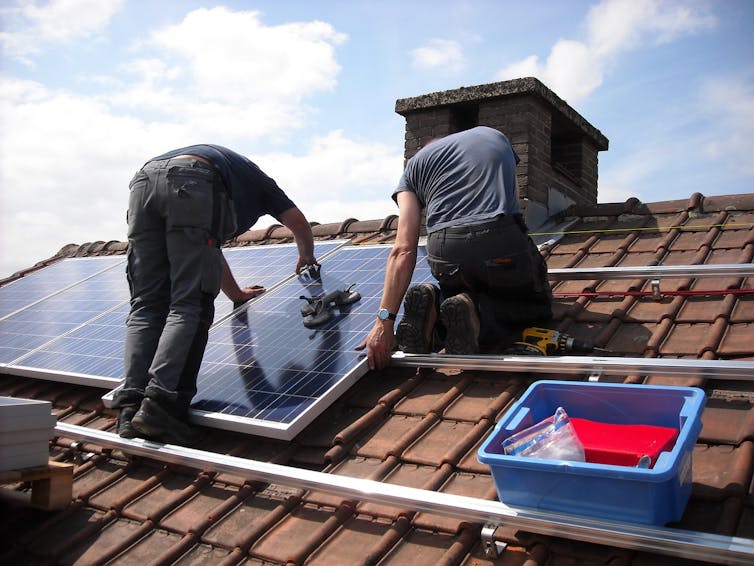Solar panels on half the world’s roofs could meet its entire electricity demand – new research
Rooftop solar panels are up to 79% cheaper than they were in 2010. These plummeting costs have made rooftop solar photovoltaics even more attractive to households and businesses who want to reduce their reliance on electricity grids while reducing their carbon footprints.
But are there enough rooftop surfaces for this technology to generate affordable, low-carbon energy for everyone who needs it? After all, it’s not just people who own their own houses and want to cut their bills who are in need of solutions like this. Around 800 million people globally go without proper access to electricity.
Our new paper in Nature Communications presents a global assessment of how many rooftop solar panels we’d need to generate enough renewable energy for the whole world – and where we’d need to put them. Our study is the first to provide such a detailed map of global rooftop solar potential, assessing rooftop area and sunlight cover at scales all the way from cities to continents.
We found that we would only need 50% of the world’s rooftops to be covered with solar panels in order to deliver enough electricity to meet the world’s yearly needs.
Method
We designed a programme that incorporated data from over 300 million buildings and analysed 130 million km² of land – almost the entire land surface area of the planet. This estimated how much energy could be produced from the 0.2 million km² of rooftops present on that land, an area roughly the same size as the UK.
We then calculated electricity generation potentials from these rooftops by looking at their location. Generally, rooftops located in higher latitudes such as in northern Europe or Canada can vary by as much as 40% in their generation potential across the year, due to big differences in sunshine between winter and summer. Rooftops near the equator, however, usually only vary in generation potential by around 1% across the seasons, as sunshine is much more consistent.
Hotspots
Our results highlighted three potential hotspots for rooftop solar energy generation: Asia, Europe and North America.
Of these, Asia looks like the cheapest location to install panels, where – in countries like India and China – one kilowatt hour (kWh) of electricity, or approximately 48 hours of using your laptop, can be produced for just 0.05p. This is thanks to cheap panel manufacturing costs, as well as sunnier climates.
Meanwhile, the costliest countries for implementing rooftop solar are USA, Japan and the UK. Europe holds the middle ground, with average costs across the continent of around 0.096p per kWh.
Rooftop solar panels look like they’d be equally useful in areas with low population as they would be in urban centres. For those living in remote areas, panels help top up or even replace supply from potentially unreliable local grids. And for those in cities, panels can significantly reduce air pollution caused by burning fossil fuels for energy.

It’s vital to point out that global electricity supply cannot rely on a single source of generation to meet the requirements of billions of people. And, thanks to changeable weather and our planet’s day and night cycle, a mismatch between solar energy demand and supply is unavoidable.
The equipment required to store solar power for when it’s needed is still extremely expensive. Additionally, solar panels won’t be able to deliver enough power for some industries. Heavy manufacturing and metal processing, for example, require very large currents and specialised electricity delivery, which solar power won’t yet be able to provide.
Despite this, rooftop solar has huge potential to alleviate energy poverty and put clean, pollution-free power back in the hands of consumers worldwide. If the costs of solar power continue to decrease, rooftop panels could be one of the best tools yet to decarbonise our electricity supply.
Siddharth Joshi, PhD Student in Global Energy Engineering, University College Cork; James Glynn, Senior Research Scholar in Energy Systems Modelling at Columbia University's Center on Global Energy Policy, Columbia University, and Shivika Mittal, Research Associate in Energy System Modelling, Imperial College London
This article is republished from The Conversation under a Creative Commons license. Read the original article.

















